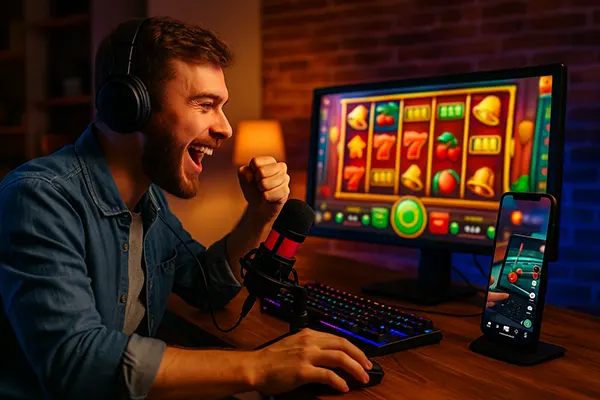
How YouTube, Twitch, and TikTok Are Shaping a New Generation of Gamblers
The face of gambling is undergoing a significant transformation, and at the centre of this shift are social platforms like YouTube, Twitch, and TikTok. As of February 2025, a growing body of evidence shows how these services are reshaping attitudes toward gambling—particularly among younger audiences—by normalising, glamorising, and sometimes even misleading their perceptions of risk and reward. This evolution raises serious concerns around regulation, psychology, and ethics.
The Role of Streamers in the Rise of Online Gambling
Livestreaming has become a powerful tool for promoting online casinos. Influencers and streamers regularly broadcast themselves playing slot machines, roulette, and card games, often with substantial sums of money involved. These broadcasts are not only entertainment—they serve as subtle advertisements, blending lifestyle content with gambling promotion.
High-profile cases have emerged, particularly on Twitch, where streamers secured lucrative sponsorship deals in exchange for showcasing gambling content. Audiences, especially young viewers, may not always distinguish between entertainment and marketing, increasing the risk of mimicry and financial harm.
What’s more, YouTube channels dedicated to casino content often include links and bonuses in descriptions, drawing viewers directly to online betting. The seamless integration of this content into daily media consumption blurs the line between passive viewing and active engagement in gambling behaviours.
Manipulation Through Demos and “Fake Wins”
One of the most controversial tactics involves the use of demo modes or “fake balance” systems. These are not real-money games, yet influencers portray them as genuine gameplay to mislead their audience. The goal is simple: create the illusion of easy wins and downplay the risks.
Research and community investigations have revealed instances where streamers were paid to use special accounts that showed inflated win rates. This artificial success convinces viewers that gambling is more rewarding than it actually is, potentially triggering impulsive or addictive behaviours.
While some platforms now enforce stricter disclosure requirements, enforcement remains inconsistent. The lack of transparency fuels misinformation, and by the time users discover the truth, they may already have lost money or developed unhealthy habits.
Ethical and Legal Tensions in Gambling Promotion
The rise of gambling-related content has sparked heated debates around its legality and ethics. Many jurisdictions have clear laws against promoting unlicensed gambling operations, yet enforcement is challenging, particularly with international platforms and content creators based in other countries.
In 2022, Twitch banned certain gambling streams after public outcry, but loopholes remain. Creators often pivot to less-regulated sites or use coded language to avoid detection, continuing to expose viewers to similar content without formal accountability.
Regulatory bodies in Europe, such as the UK Gambling Commission, are increasing scrutiny of these practices. However, the pace of change in the digital content landscape outstrips the ability of legislation to respond, creating a legal grey zone that benefits marketers more than consumers.
Influencer Accountability and Platform Responsibility
Content creators with large followings have a disproportionate influence on public behaviour, especially when it comes to vulnerable or impressionable audiences. As a result, the ethical burden on them is substantial.
Despite this, many streamers cite financial necessity or creative freedom when questioned about promoting gambling. The platforms themselves often take a passive role, relying on vague community guidelines instead of clear enforcement policies.
Experts argue that greater transparency—such as mandatory disclaimers, age verification tools, and better moderation—could reduce harm. Still, without structural changes and stronger incentives to comply, self-regulation remains largely ineffective.

The Psychological Impact of “Live Success” and Virtual Wins
One of the most compelling features of gambling content is its emotional appeal. Seeing someone win £10,000 on a livestream triggers excitement, aspiration, and even envy. This phenomenon, known as parasocial reinforcement, makes the viewer feel connected to the streamer’s experience—even when outcomes are unrealistic.
This “live success” effect has a documented psychological impact. Studies show that repeated exposure to these types of wins can condition viewers into thinking such outcomes are achievable with little risk. Combined with the impulsivity and reward sensitivity of younger demographics, this content can be a powerful trigger for risky behaviour.
Moreover, short-form content on TikTok amplifies this effect. In under a minute, a viewer can witness a big win, the streamer’s celebration, and a direct call-to-action to try it themselves—without any context about losses, odds, or responsible gaming.
Mitigating Psychological Harm Through Education
Addressing the psychological consequences of gambling content requires proactive intervention. Schools, parents, and public institutions need to be involved in fostering media literacy, especially around financial risks and digital manipulation.
Some non-profit organisations now offer online toolkits to help younger audiences critically assess gambling content. These tools teach users to identify promotional tactics, recognise misleading narratives, and understand the role of chance versus skill.
However, education alone cannot solve the problem. It must be supported by consistent messaging, better oversight, and, ideally, algorithmic adjustments that limit the spread of harmful content to underage users or vulnerable individuals.
Similar articles
-
 Cascading Wins: Why Winning Stre...
Cascading Wins: Why Winning Stre...Anyone who has spent time in a casino, whether online or land-based, has …
-
 Should you play a slot demo to t...
Should you play a slot demo to t...Demo mode is a useful way to understand how a slot works without …
-
 Optimal Bet Size for a Long Sess...
Optimal Bet Size for a Long Sess...Long casino sessions are rarely lost because of one “bad beat”. More often, …
-
 Why Card Counting Appears More E...
Why Card Counting Appears More E...Card counting has long been associated with an image of control, logic, and …
